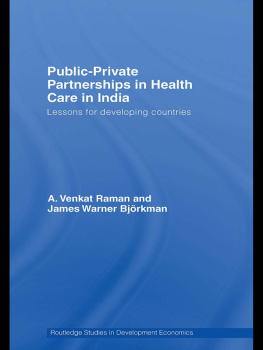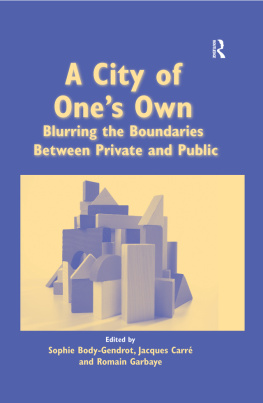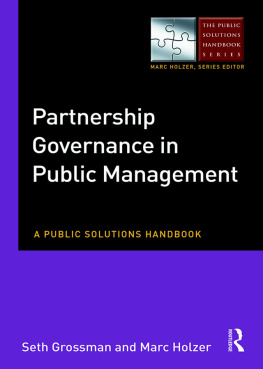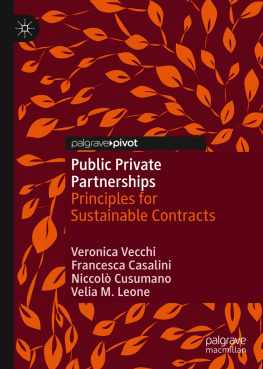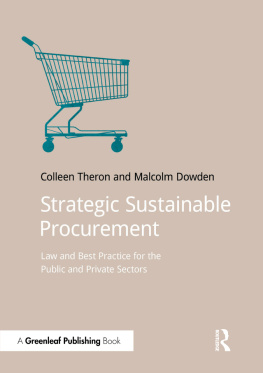Empowering the Public-Private Partnership

Empowering the Public-Private Partnership
The Future of Americas Local Government
George V. Voinovich
Introduction by
R. Gregory Browning and Hunter Morrison
Afterword by Hunter Morrison
Ohio University Press in association with the Voinovich School of Leadership and Public Affairs
Athens, Ohio
Ohio University Press, Athens, Ohio 45701
ohioswallow.com
2017 by Ohio University Press
All rights reserved
To obtain permission to quote, reprint, or otherwise reproduce or distribute material from Ohio University Press publications, please contact our rights and permissions department at (740) 593-1154 or (740) 593-4536 (fax).
: George V. Voinovich, 2008. U.S. government photo
Printed in the United States of America
Ohio University Press books are printed on acid-free paper 
27 26 25 24 23 22 21 20 19 18 17 5 4 3 2 1
Library of Congress Control Number: 2017942363
Contents
Acknowledgment
Ohio Universitys Voinovich School of Leadership and Public Affairs was honored to assist Senator George Voinovich and the Ohio University Press in reviewing and finalizing this manuscript. Mike Zimmer, an executive in residence, and G. Jason Jolley, an associate professor with the Voinovich School of Leadership and Public Affairs, served as reviewers for the book and provided helpful suggestions to Senator Voinovich and Ohio University Press.

George V. Voinovich and Janet Voinovich, June 19, 2010.
By permission of the Ohio Republican Party
Empowering the Public-Private Partnership
Introduction
R. Gregory Browning and Hunter Morrison
George Voinovich was a practical man, and this book is a primer for practitioners. Written in plain language, it is a handbook of best practices for elected and appointed officials and for leaders from the private and philanthropic sectors who partner with them for the betterment of their community. His words here distill the knowledge and wisdom of a man who dedicated his career to public service at the local, state, and federal levels and who was, as a result, a person uniquely qualified to reflect on the qualities of civic leadership required to get things done.
Voinovich was passionate about the power of public-private partnerships (P3s) to transform a community. He was widely respected for his honesty, authenticity, and straight talk, so you can believe him when he says that these partnerships will work for youbecause he tried them himself in his positions as mayor and governor. In this primer, he describes the critical steps to follow when building any partnership and tells the story of how the practice of partnering unfolded in the City of Cleveland and the State of Ohio under his stewardship.
Voinovich was a storyteller. But unlike those who delight in telling stories that reflect well on themselves, hed tell stories about the people who joined him in the efforts to rebuild Cleveland after years of contentious political infighting and later to set the State of Ohio on a fiscally sound trajectory. Voinovich campaigned for mayor of Cleveland on the slogan Together We Can Do It. This primer is about how together we did it. Here he tells stories about the individuals and organizations he brought together to advance their common interest in the community whose history and future they shared.
Voinovich saw community as a dynamic, interactive system that performs best when its leaders adhere to rules of civility and value the interests and humanity of each person with whom and for whom they work. He summed up this complex process in one word: symbiosis. Drawn from the world of biology, it describes an interdependent or mutually beneficial relationship between two or more organisms. He delighted in dropping symbiosis into the middle of otherwise mundane remarks at a ground breaking or ribbon cutting and then telling his audience that the project they were gathered together to celebrate was a perfect example of how people could accomplish great things by working together. This primer is filled with stories about the ways in which he engaged parties with seemingly disparate interests, encouraged them to find their mutual goals, and urged them to collaborate for the common good. These stories suggest how you, too, can encourage the symbiotic civic relationships that will foster long-term success in your community.
Voinovich was a teacher who practiced civic pedagogy everywhere he went. He taught several generations of public servants how to work together to do more with less and work harder and smarter. He believed that the art of public leadership requires establishing clear, easily understood goals, communicating them relentlessly, and monitoring them consistently. He had no patience with cynical indifference, bureaucratic infighting, or empire building. This primer tells how he and his chief of staff, Tom Wagner, used Clevelands Operations Improvement Task Force (OITF) to engage city staff in creating a practical plan for improving operations and then to hold those staff accountable for carrying out their own recommendations.
Voinovich respected the intelligence and dedication of those who choose to make a career in public service. He believed that the vast majority want more than just to do their job and collect a paycheck. They want to improve the lives of their fellow citizens. He believed that many public servants have an untapped desire to work beyond the limits of their job description to make a real difference in their community. The OITF brought these desires to the surface and channeled them into specific initiatives that have made a difference for Cleveland and its citizens. This primer tells of how he took the lessons learned from the OITF and applied them statewide though a disciplined system of Total Quality Management (TQM). He believed that the lessons of civic collaboration are scalable and can improve performance at every level of government.
Finally, Voinovich was a leader. Modest and unassuming, he avoided grand promises and high-sounding rhetoric. He preferred, instead, to speak about practical accomplishments and the important role that others played in making those accomplishments possible. At his core, he was a leader committed to putting good ideas to work for the benefit of the communities he served. He firmly believed that those privileged to lead a government, a corporation, a university, or a philanthropy have an obligation to serve interests beyond their own. Not unremarkably, he found that when asked, most of those in leadership positions responded positivelyif they could be assured that their contribution would be valued and effective. He believed that one of his roles as a public leader was to make good on that promise. By valuing and celebrating the accomplishments of others, he restored civility and trust to Clevelands civic life and established a virtuous cycle of public and private reinvestment that has fueled several decades of increasingly sophisticated development initiatives in the citys downtown and its neighborhoods.
Voinovich wrote this primer about P3s as a practical tool for meeting the challenges of public management in a world of straitened circumstances. The lessons that he learned during his ten years as Clevelands mayor and eight years as Ohios governor are even more relevant today than they were in years past. When he was sworn in as Clevelands fifty-fourth mayor in 1980, constrained municipal resources were more the exception than the rule for local governments. Today they are more the rule than the exception. He tells how, in the face of the citys dire economic conditions, he turned to Clevelands business and philanthropic communities for helpfirst in analyzing the citys finances, operations, and economic prospects, and then in taking concrete steps to address together the challenges they found.
Next page

